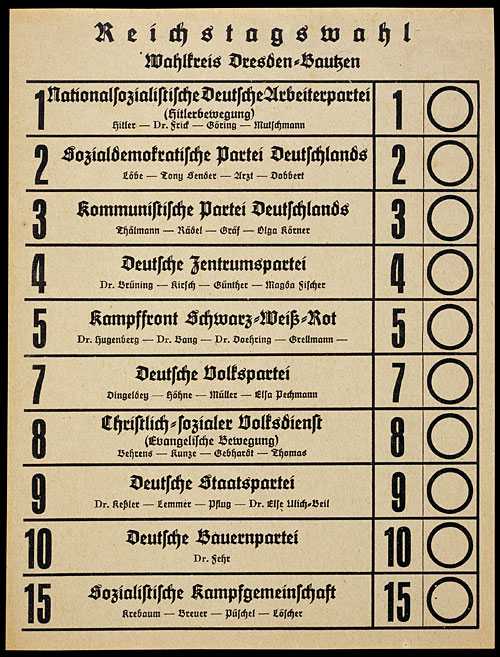
Homefront
Weimar Democracy in action ...
USHMM (collection)
Ballot paper for the constituency of Dresden-Bautzen in the Reichstag election of 5 March, 1933 - the last Weimar Republic general election which could be said to be in any way "free and fair". The ballot works on the basis of a "closed list" system of proportional representation. To contest the election, one must be a representative of a recognized political party or movement. Each party publishes a list of candidates, in order of preference for appointment (either for the constituency or nationally). In order to vote, the voter simply ticks the circle opposite the party name (Nazi voters would, in this case, have ticked the topmost circle). Seats would then be distributed in direct proportion to the percentage of votes cast for each party. While the resulting distribution of seats-to-votes was not spot-on proportional, it came very close. This was, at least, a very "fair" electoral system. In the March elections, the Nazis came first in 33 of the 35 national constituencies. The exceptions were Koln-Aachen and Kobleng-Trier which (not surprisingly) went for the Centre (predominantly Roman Catholic) Party. However, because of the moderating effect of the proportional representation system, they still fell short of an overall majority in the Reichstag. With the conservative/reactionary President Hindenburg still living, this left Hitler relying on the support of Hindenburg's conservative/reactionary friends in the Reichstag as coalition partners in order to command a majority in the Lower House. Irritating though this situation was to Hitler, it was enough to turn himself into dictator. In the aftermath of the Reichstag Fire (27 February, 1933), Hitler secured the passage of the "Law to remedy the distress of the German People and the Reich" by both Houses of Parliament on 23 March, 1933, with the support, not only of his reactionary coalition partners, but of all right-wing parties in parliament. Socialist deputies were effectively excluded from attendance by SA "security" - but this would not have mattered, anyway. Generally known as the "Enabling Act", this legislation dispensed with the need for the Reichstag in the making of laws, which could now be enacted by the Government under promulgation by the Reich Chancellor (Hitler) and ... er ... that was more or less it. There was one fly in the ointment - the Act did not purport to (indeed could not) interfere with the powers of the President, meaning that Hindenburg (or any hostile successor-president) could, amongst other things, revoke the Enabling Act. Thus it remained important to the Nazis that Hitler should be in a position to succeed Hindenburg and unite the offices of Chancellor and President to secure his power fully. This had important consequences, since it left Hitler vulnerable to the attentions of Hindenburg's "minders" - the Generals of the Army Truppenampt/High Command - who might, if not placated, use Hindenburg to undo Hitler's work. Some of those consequences were visited on Ernst Rohm and his senior SA cronies in the "Night of the Long Knives". In the end, Hitler did succeed Hindenburg as "Fuhrer and Chancellor", and they all lived happily ever after (shurely some mishtake ...?). Best regards, JR.
2214 Views
9/2/2014
